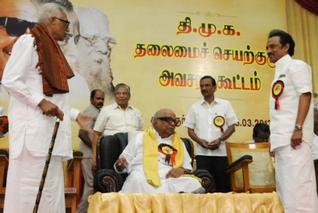 Chennai, Mar 25: After quitting the UPA coalition on the Sri Lankan Tamils issue, DMK on Monday demanded that India should boycott the Commonwealth Heads of Government meeting scheduled to be held in Colombo in November this year.
Chennai, Mar 25: After quitting the UPA coalition on the Sri Lankan Tamils issue, DMK on Monday demanded that India should boycott the Commonwealth Heads of Government meeting scheduled to be held in Colombo in November this year.“While Commonwealth Secretariat should not convene the meeting at Colombo, but if it happens, India should boycott the meeting in order to reflect the sentiments of Tamils worldover and to keep up the democratic spirits,” the DMK Executive Meeting said.
Chaired by party chief M. Karunanidhi, the meeting was attended by senior party leaders, but his son M.K. Alagiri, who is sulking on not being consulted over the party’s pull out of UPA, skipped it.
This is the first high level meeting of the party after it withdrew support to the UPA government last week charging that the Centre failed to bring amendments to the U.S.-sponsored resolution at the UNHRC against Sri Lanka for the alleged human rights violations during its crackdown on LTTE four years ago.
When some countries had decided against attending the Commonwealth meeting, “India without any hesitation should announce its decision about boycott immediately,” the party said in a resolution.
Defending its decision to snap ties with the UPA, DMK said it had provided stability to the Congress-led coalition from 2004 and solidly backed it in 2009.
“Kalaignar (Karunanidhi) and DMK deserve credit for providing stability and preventing the collapse of the government” when the Centre faced several critical situations on issues like FDI in retail and to keep the communal forces at bay, the resolution said.
Slamming the Centre on the Lankan Tamils issue, it said New Delhi continued to extend all assistance to Colombo terming it as a “friendly country” and insisted that India should bring a resolution on its own against Sri Lanka before the UNHRC.
Referring to the attack on Tamil Nadu fishermen allegedly by the Sri Lankan Navy, the DMK said despite its repeated pleas on the protection of fishermen, it seemed that the Centre has not taken any effective steps so far.
“The Centre should not delay further and take strong action to protect Tamil Nadu fishermen,” the resolution said.
The meeting passed as many as 16 resolutions.
In a resolution, the meeting urged the Centre to take steps to complete the Sethu Samudram project by defeating the designs of communal forces, which were trying to stall it.
The meeting also narrated the benefits that Tamil Nadu had received during DMK’s alliance with the UPA coalition at the Centre.





Comments
Add new comment